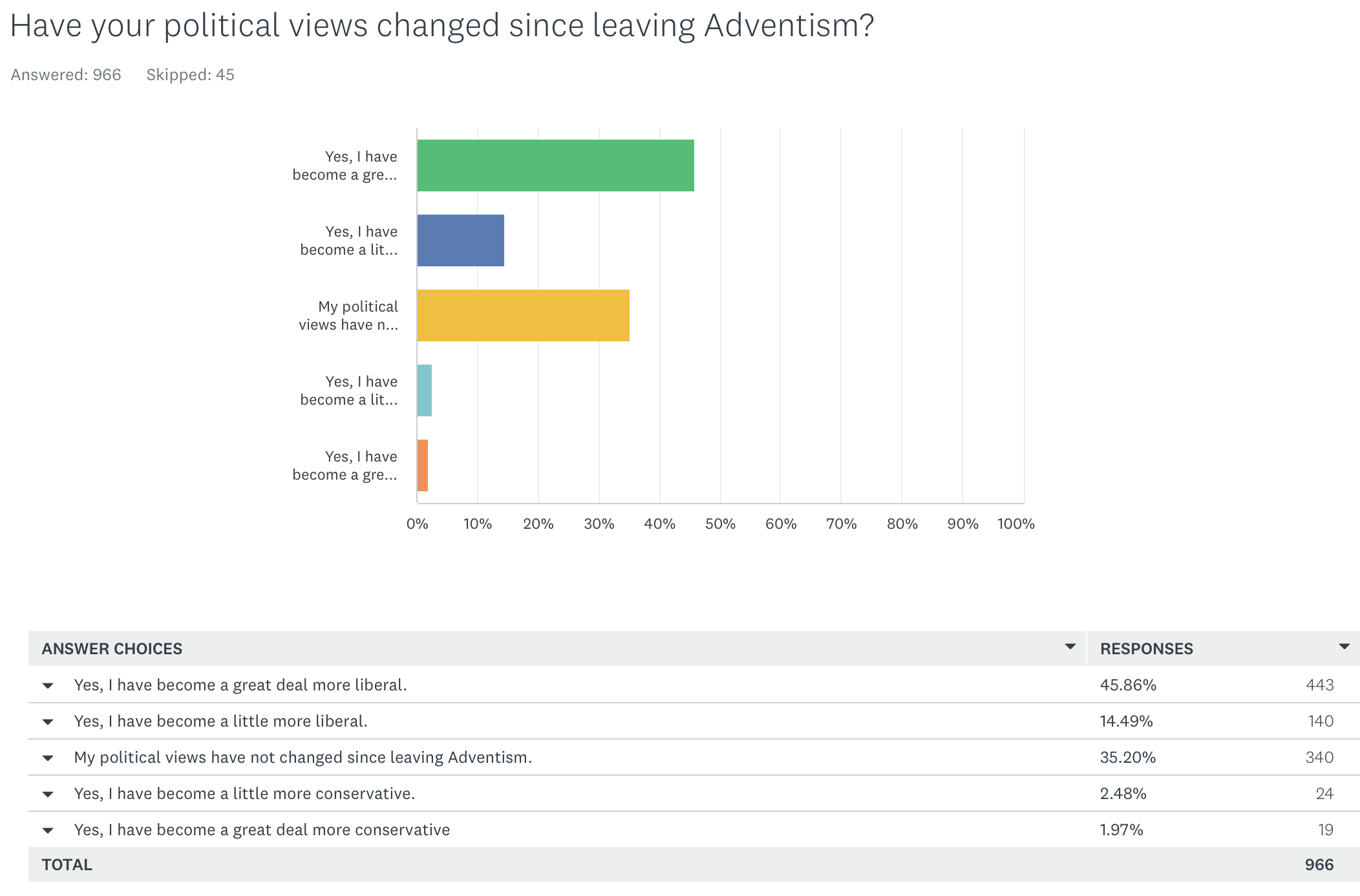The Survey: Some Questions and Answers
Our research team made an internet survey available to interested former Seventh-day Adventists and current members strongly considering leaving the denomination. Well over a thousand respondents from around the world filled out the survey. Below is a quick glance at our methods and results.
Q: What was the major reason for our survey?
A: Actually, the survey had two major purposes. One was to give the respondents an opportunity to voice their experiences within, and concerns about, the Adventist Church. In this sense, we hoped it would act as a service to the many former Adventists who feel burdened, emotionally or otherwise, by their time associated with the church.
A second purpose was the research one. Among other things, we wanted to gain insight into the reasons that members leave a fundamentalist Christian denomination (the Seventh-day Adventists, in specific), the characteristics of those who leave compared to those who do not, the psychological harms that they feel that experience in the church may have caused them, ramifications of leaving (including relief, regret, nostalgia). We chose the Seventh-day Adventist Church because so little research has so far been done on its former members, as opposed to similar fundamentalist churches, such as the Mormons and the Jehovah’s Witnesses. Our goals include a peer reviewed research article in a major national academic journal and at least one public scholarship article.
Q: What are the major takeaways from the research?
Although yet still in the preliminary stages of analysis, we have gleaned several findings from our data. Those respondents who left the Adventists, not surprisingly, were very critical of the church. Large proportions felt that it did psychological harm to them as they were in the organization and feel that they still suffer after having gotten out. Many are currently (at the time of filling out the survey) undergoing psychological therapy or are members of ex-Seventh-day Adventist support groups. A majority feels that the church fosters a stunting of cognitive development. Similarly, a majority indicates that the Adventist church is a cult and has a negative impact on the world. As well, a majority feels that the Adventist church, with its stress on the incipient Second Coming of Christ, promotes apathy among its members on such issues as environmental degradation and social justice.
Large percentages of our respondents became more politically liberal after leaving the Adventist church. Large numbers became atheists or agnostics. Many expressed gratitude (sometimes at great length and in very heartfelt ways) at being able to have their voice heard about their experiences in the church.
Psychological and sexual abuse is endemic in the church with females more likely to be victimized. There is frustration that little of substance is being done within the church to address abuse.
Q: What are some political implications of our findings?
A major finding was the liberal political tilt in the respondents. The current flight from the Seventh-day Adventists would seem to be a part of a larger trend in the USA away from organized religion in general. Polls have shown that the proportion of Americans who are atheists, agnostics, and “of no particular religion” are growing dramatically. Those subscribing to Christianity are falling as a percentage of Americans. To the extent that the former Adventists of our survey represent this secularizing trend, then we might predict a more politically liberal electorate as time goes on. This, of course, could have major ramifications in elections.
Those subscribing to Christianity are falling as a percentage of Americans. To the extent that the former Adventists of our survey represent this secularizing trend, then we might predict a more politically liberal electorate as time goes on. This, of course, could have major ramifications in elections.
Q: Why did we ask the particular questions that we included in our survey?
Our questions were a combination of the quantitative and qualitative format. The quantitative items asked a question that could be answered on a one-to-five scale. These questions are easily subjected to statistical analysis. The qualitative items were open-ended questions. These allowed the respondents to answer as much as they felt comfortable in doing.
The particular questions we asked were designed, among other things, to determine the reasons for members’ dissatisfaction with the Seventh-day Adventists, possible abuses within the system, the intellectual and emotional environment of the organization, the impact of getting one’s education within the SDA structure, and the consequences of leaving.
Q: Can our results be generalized to other fundamentalist denominations, such as the Mormons and the Jehovah’s Witnesses?
Basically, yes. We feel that the Mormons, the Jehovah’s Witnesses, and the Seventh-day Adventists are alike in many ways; most importantly, they are fundamentalist denominations. Many “mainstream” American denominations consider them extreme or even fringe groups.
The sorts of experiences that our respondents relate and the psychological distress that they suffer are very consistent with those shown by research into ex-Mormons and ex-Jehovah’s Witnesses.


 Follow
Follow